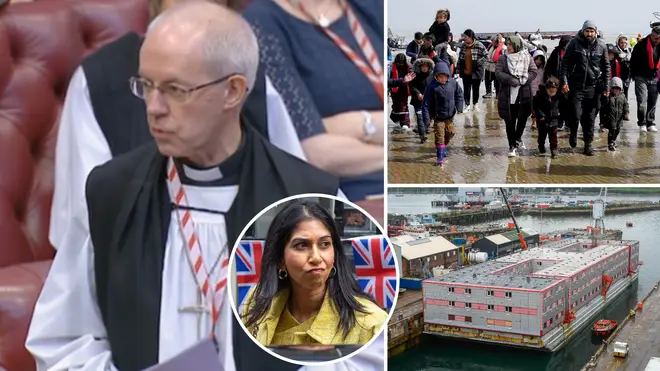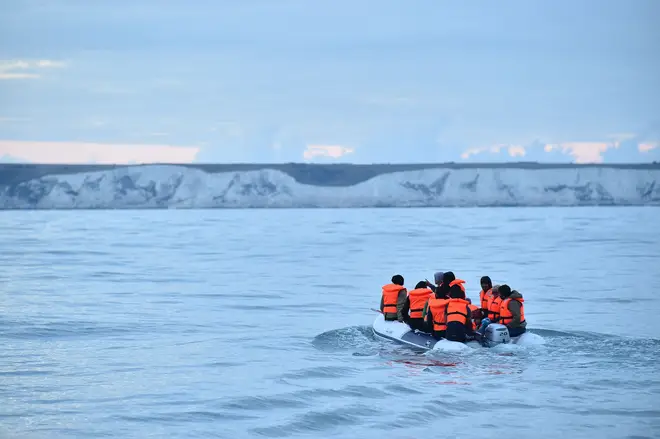
Ian Payne 4am - 7am
10 May 2023, 12:01 | Updated: 10 May 2023, 12:35

The Archbishop of Canterbury has hit out at the government's asylum bill as "morally unacceptable".
Speaking in the House of Lords, Justin Welby argued against the flagship legislation aimed at ensuring people who arrive in the UK in small boats would be detained and promptly removed, either to their home country or a third country such as Rwanda.
He said: "This bill has no sense at all of the long term and the global nature of the challenge that the world faces.
"It ignores the reality that global migration must be engaged with at source as well as in the Channel as if we as a country were unrelated to the rest of the world."

Controversial migrants bill slammed as 'morally unacceptable'
The archbishop added that the bill does not make any effort to tackle issues that are causing mass migration, including wars and climate change.
"It is isolationist, it is morally unacceptable and politically impractical," he said.
The House of Lords sat earlier from 11am on Wednesday to consider the Illegal Migration Bill at second reading after it passed the Commons, with almost 90 speakers including the archbishop listed.
The Bill includes provisions that would limit the ability of the European Court of Human Rights (ECHR) to prevent the deportation of asylum seekers.
April was the busiest period for small boats so far this year, with 1,850 of this year's 5,652 arrivals making the journey last month.
But Mr Welby said the Bill "risks great damage to the UK's interests and reputation at home and abroad, let alone the interests of those in need of protection or the nations who together face this challenge."
He added: "Our interests as a nation are closely linked to our reputation for justice and the rule of law, and to our measured language, calm decision, and careful legislation. None of those are seen here."
He went on: "We need a Bill to reform migration. We need a Bill to stop the boats. We need a Bill to destroy the evil tribe of traffickers. The tragedy is that without much change this is not that Bill.
"This Bill fails to take a long term and strategic view of the challenges of migration and undermines international co-operation rather than taking an opportunity for the UK to show leadership."

Mr Welby said that the UK should be leading in global efforts to help migrants.
He said he planned to table amendments to the Bill at committee stage to introduce efforts to combat human traffickers.
Liberal Democrat Lord Paddick, a former senior police officer, has also proposed a so-called fatal motion to the proposed legislation, aimed at stopping it in its tracks at its first Lords hurdle.
Read more: Explained: What are Rishi Sunak's new immigration laws?
His amendment argues the draft legislation would see Britain fail to meet its international law commitments, allow ministers to ignore the directions of judges and undermine "the UK's tradition of providing sanctuary to refugees", while failing to tackle the backlog of asylum cases or people smuggling gangs.
But the archbishop said he would oppose Lord Paddick's fatal motion, and urged others to do the same, saying it was the Lords' duty to change the bill, not to throw it out completely.

The proposed Bill has been prompted by Prime Minister Rishi Sunak's pledge to "stop the boats" bringing migrants across the English Channel.
More than 6,000 migrants have crossed the channel so far in 2023.
To cope with the numbers, the Government plans to use disused military camps and a barge as accommodation centres.
But critics argue the flagship immigration reforms break international law and threaten modern slavery protections.
Bob Neill, who also chairs the Justice Select Committee, said he is "not convinced" that the Bill will stop the flurry of boats making the perilous journey across the Channel.
The archbishop, in a speech to the Lords last year, warned against "harmful rhetoric" that treats those arriving in the UK as "invaders".
He has previously called for a better system based on "compassion, justice and co-operation across frontiers".